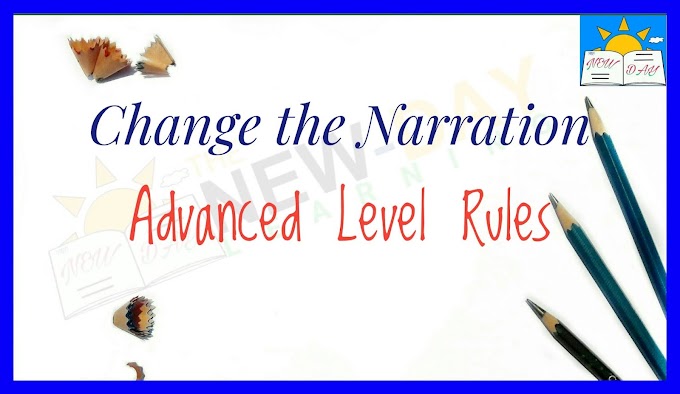What is a Question Tag?
Question tag is a feature of spoken language. The speaker uses a yes-no question with a statement to confirm his or her opinion from the audience.E.g. –
You read newspaper daily, don’t you?
-In the sentence above, the first part “You read newspaper” – this part is a statement made by the speaker, while the second part “...don’t you?” – this part is used to confirm what is there in the statement. And this is the Question Tag.
Structure of a Question Tag:
Statement + , + auxiliary verb + n’t / not + subject + ?Example:
You like her, don’t you?
Statement – You like her, (subject + verb + object).
Question tag – don’t you?
— here ‘do’ is the auxiliary verb (do+not=don't) and ‘you’ is the subject.
In examinations, the statements are given and we are asked to find out a suitable question tag from the options.
In examinations, the statements are given and we are asked to find out a suitable question tag from the options.
Like,
Choose a suitable question tag of the statement below –
She sends the mail, ........?
A. does she?
B. doesn’t she?
C. did she?
D. didn’t she?
What is the correct option?
Let’s find...
Question Tag Rules with Example:
Rule 1:
If the statement is affirmative, the question tag is negative. And, if the statement is negative, the question tag is affirmative.As the statement “She sends the mail”, is an affirmative, the question will be negative.
So, the correct answer is either option B. or option D.
The statement “She sends the mail” is in present indefinite tense. Here we see that option B (“Doesn’t she?”) is in present indefinite tense and option D is not.
Rule 2:
Usually, the tense of the statement and the tense of the question tag is the same.The statement “She sends the mail” is in present indefinite tense. Here we see that option B (“Doesn’t she?”) is in present indefinite tense and option D is not.
So, option B will be the correct answer in this case.
She sends the mail, doesn’t she?
– that is will or won’t + you (the subject of the statement).
She sends the mail, doesn’t she?
Rule 3:
If the statement is an affirmative imperative sentence, the question tag will be in future indefinite tense.– that is will or won’t + you (the subject of the statement).
— We know that the subject of an imperative sentence is generally 'you' which is not written but understood.
Here, the statement is an imperative one, we use 'you' as the subject of the question tag.
In this case the question tag used in both sentence – negative and positive, both are correct, whatever the statement is.
Like,
- Go home, will you? (Correct)
- Go home, won’t you? (Correct)
- Respect your teachers, will you? (Correct)
- Respect your teachers, won’t you? (Correct)
- Please allow me to enter the room, will you? (Correct)
- Please allow me to enter the room, won’t you? (Correct)
Rule 4:
The question tag of a negative imperative sentence is always affirmative.E.g. -
- Don’t touch the electric wire, will you? (Correct)
- Don’t touch the electric wire, won’t you? (Incorrect)
- Don’t waste your time playing video games, will you? (Correct)
- Don’t waste your time playing video games, won’t you? (Incorrect)
Rule 5:
If an imperative sentence starts with Let (Like– Let me, Let her, Let him, Let them, Let John.), question tag “will you?” is used.E.g. –
- Let me finish my point, will you?
- Let them fight for their rights, will you?
- Let her drive the car, will you?
- Let John finish his meal, will you?
Rule 6:
If an imperative sentence starts with Let us or Let’s (Let's = Let+us), then the question tag is “shall we?”E.g. –
- Let us finish the match, shall we?
- Let’s go, shall we?
- Let’s defeat them, shall we?
Rule 7:
If the statement starts with negative words like no one, nobody, then the question tag is – helping verb + they + ?
And if it starts with nothing, the question tag will be – helping verb + it + ?.
E.g. –
- No one helps me, do they?
- Nobody knows you, do they?
- Nothing is immortal, is it?
Rule 8:
If a statement includes words like little, few, scarcely, hardly, rarely, barely, seldom have negative tones. Hence, the question tag is positive/affirmative.
Like,
He talked little about his past – this statement suggests that he (the subject) does not talk much about his past. So it has a negative meaning and the question tag will be affirmative – that is “..., did he?”
E.g. –
- He talked little about his past, did he?
- Few people know me, do they?
- They scarcely come out of there house, do they?
- We hardly ride bicycle, do we?
- Seldom do I visit my relatives, do I?
- He can barely read without the spectacles, can he?
Rules to Select the Subject of a Question Tag:
Rule 1:
If the subject of the statement is a personal pronoun, such as – I, we, you, he, she, they, it, the subject of the question tag is the same personal pronouns.
E.g. –
- I play football, don’t I?
- You don’t know his name, do you?
- She is my sister, isn’t she?
- It is raining, isn’t it?
Rule 2:
If the subject of the statement is a proper noun or common noun, the subject of the question tag is a personal pronoun according to the number, person and gender of the proper noun and common noun.E.g. –
- Harry is a liar, isn’t he?
- Mrs. Brown is a charming lady, isn’t she?
- Thomas and Harry have done it, haven’t they?
- The boy was swimming, wasn’t he?
- The girl took the picture, didn’t she?
Rule 3:
When the subject of the statement is a indefinite pronoun as– Someone, everyone, no one, some body, everybody, nobody, anybody, anyone, then the subject of the question tag is ‘they’.Remember: All those pronouns are singular in meaning, so, they are followed by a singular verb (is, was, has, does etc.). But, the pronoun ‘they’ is plural, hence use a plural verb (are, were, have, do etc.) with it.
E.g. –
- Everybody knows it, don’t they?
- Everyone was present there, weren’t they?
- Anybody can frighten him, can’t they?
- Nobody can defeat her, can they?
- Someone has received the call, haven’t they?
Rule 4:
If the subject of the statement is everything, anything, nothing etc. the subject of the question tag is ‘it’.E.g. –
- Nothing is permanent, is it?
- Anything can happen, can’t it?
- Everything is temporary, isn’t it?
Thank you...





%20(1).webp)


%20(1).webp)
1 Comments
nice info
ReplyDeleteLeave a comment